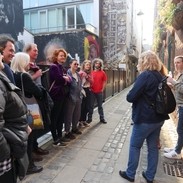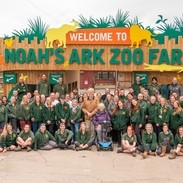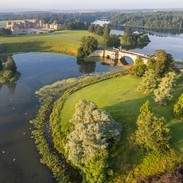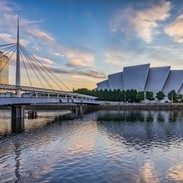TV and copyright licences
Rowley Farm Holidays

Disclaimer
Disclaimer: While every effort has been made to ensure the accuracy of the information contained in the Pink Book, we regret that we cannot be responsible for any errors. The Pink Book contains general information about laws applicable to your business. The information is not advice, and should not be treated as such. Read our full disclaimer.
Key facts
If you play recordings of any copyrighted music on your premises (this includes background music, or music made available on devices such as TVs and radios) or if the music is performed live, you may need TheMusicLicence from PPL PRS Ltd.
If you play a TV in public areas with the sound on, you need TheMusicLicence from PPL PRS Ltd.
If you offer short-stay accommodation (of any kind) to overnight visitors and have installed TVs in the accommodation, you need a ‘Hotel and Mobile Units Television Licence’ (hotel licence).
If you offer a DVD film library, you need a DVD Concierge licence.
If you operate an in-room entertainment system you need a Hotel Vision licence.
If you show films or TV programmes, including channels such as ITV or BBC1, you need an MPLC licence.
If you use images in your marketing, you must have permission to use them from the copyright owner.
Television licences
Do I need a special licence?
Maybe: for non-accommodation businesses, you will need a licence if you provide a TV or a programme-streaming service such as NOW, ITVX or BBC iPlayer for either staff or customers on any part of your premises. If your premises is a single unit then you will only need a single TV licence at the standard rate of £159. However, if your business has multiple units (for example corporate boxes at a football stadium) then you will need a special Hospitality Licence which costs £159 for the first 15 units and £159 for each further five units.
Yes: if you offer short-stay accommodation to overnight visitors, whether in serviced or self-catering accommodation, and you provide a device on which your guests can view TV programmes, you need to apply for a ‘Hotel and Mobile Units Television Licence’ (hotel licence). It should be noted that a licence is required regardless of whether the TV programmes are viewed through a TV, computer, mobile phone, games console, digital box, DVD player or any other device.
Note: despite its name, the hotel licence encompasses accommodation ranging from hotels, guesthouses, bed and breakfasts and inns to holiday cottages, flats and chalets through to camping and caravan sites and narrowboats.
The TV Licensing Authority says that you should always take out a hotel licence if you are providing televisions for the use of paying guests. While staying on your property, guests are not covered by their home licence. There is one exception: long-term hotel residents (those staying more than 28 days) are not covered by a hotel licence, but they must have an ordinary television licence.
Note: while accommodation provided in sited caravans falls under the hotel licence scheme, there are different rules for touring caravans or mobile homes. The hirer of a touring caravan or mobile home may be covered by the licence for their home address, as long as the television receivers are not being used at their home and caravan or mobile home at the same time.
Hotel licence fees
Your licence fee will be based on the number of units of overnight accommodation that you have available to let:
- If you have up to 15 units with televisions installed, you will pay one full fee of £159.
- If you have more than 15 units, you will pay one full fee for the first 15, and an additional £159 for every extra five units (or fewer).
- The hotel licence is available only from TV Licensing. (See Further guidance, below).
What does the licence cover?
It will cover any equipment that can be used to watch or record TV programmes in:
- Hotels, inns, guest houses, holiday villages, caravans and campsites.
- The owner’s private rooms on the site.
- On-site staff accommodation (if provided by the hotel/accommodation owner).
- Lounges or other common rooms that are open to people staying on the site.
It does not cover:
- TV equipment which is not provided by the proprietor of the accommodation.
- TV equipment in long-term letting accommodation and for permanent residents.
Note: an important feature of the regulations is that a TV licence only covers one or more units if they are ‘on the same site’ or ‘within the same premises’. That means a site or premises that is not divided or separated by any public thoroughfare such as a road or footpath or by another private property. For example, if you have a chain of businesses or your attraction spans two sides of a road, or your hotel has an annexe in a separate property next door or if you let holiday cottages in different locations, you will need a Company Group TV Licence.
If you have a TV in public areas, such as a bar or breakfast room, which has the sound turned on, you will also need TheMusicLicence from PPL PRS Ltd.
Copyright licences for music
The Copyright, Designs and Patents Act 1988 states that any use of copyrighted music in public is possible only with the permission of the person who holds the copyright to the music being played.
‘In public’ means anything outside a family/domestic situation, and includes all areas of a tourism accommodation property, including guests’ rooms. So, even if you just have a radio in the breakfast room or TVs in guests’ rooms, you may require a licence.
There are two separate copyright licences that relate to the playing of copyrighted music on your premises. They apply regardless of the device provided by which the music is played, and even apply if the music is performed live.
The first music copyright licence fee is to pay the performers and record companies for the use of their recorded music. The fee for this licence is collected by PPL and is known as a PPL Licence.
The second music copyright licence fee is to pay the songwriters, composers and music publishers for the use of their musical compositions and lyrics. The fee for this licence is collected by PRS and the licence is known as a PRS Licence.
While PPL and PRS licences can be paid separately, the two collection companies also work together to provide a single licence that covers both copyright fees where this is required. This combined licence is called TheMusicLicence.
Do I need a music copyright licence?
No: You are exempt from requiring either a PPL or PRS music licence if:
- You have a bed and breakfast or guesthouse that has three guest bedrooms or less, and;
- The premises is the only holiday accommodation business that you own or operate;
- The premises is also your domestic residence;
- Facilities are only available to resident guests;
- You have a self-catering property which comprises fewer than four self-catering units (regardless of how many bedrooms there are in each unit), and:
- The premises is the only holiday accommodation business that you operate;
- Facilities are only available to resident guests.
Yes: you need a combined TheMusicLicence that covers both PPL and PRS copyright fees if you operate a business that is outside the exemptions detailed above.
Is a licence required for copyrighted music in customers’ rooms?
Yes: a licence is required where music can be played in guests’ rooms via TVs, radios and other devices that you provide for guests. A licence is not required where the guest provides their own device and, for example, plays music that they access through the internet.
The PPL PRS Code of Conduct clarifies the rights and responsibilities of PPL PRS and businesses that provide music. An ombudsman has also been established to oversee PPL PRS’s performance and to adjudicate on complaints.
Tariffs
The tariffs relating to TheMusicLicence continue to be set by both PPL (representing the copyright for recordings) and PRS for Music (representing the copyright for songs being played) separately. Licence tariffs vary in accordance with the type of performance (live or recorded), the type of premises, the occasion and the frequency of performances.
There is a wide range of tariff rates depending on the type and scale of business you operate. They include separate tariffs for:
- Amusement parks, saloons, arcades, travelling showmen, funfairs;
- Parks, open-air places, pools;
- Cinemas;
- Theatres;
- Holiday centres;
- Holiday caravan parks;
- Hotels, restaurants and cafés;
- Pubs;
- Passenger ships and boats.
You can obtain more information by contacting the PPL PRS Customer Service Centre online, or via 0800 0720 808.
Obtaining a licence
If a licence is required, you can find more information on the costs by viewing the separate tariff cards for each of the categories on the PPL PRS website.
PPL PRS has a dedicated section of its website for hotels, bed and breakfasts and guesthouses. You can view all the tariffs which relate to your establishment and a checklist of information needed to obtain a quote, which includes:
- Music in bedrooms.
- Number of bedrooms supplied or provided with recorded music.
- Background music – all premises.
- Areas where music is audible, such as receptions, bars, etc.
- Premises with 16 bedrooms or more.
- The square meterage of each area where music is audible.
- Number of seats in bar and restaurant areas where music is playing.
- Types of devices used to play music, such as radio, CDs, TV etc.
- Live events.
- Number and capacity of live events held per year.
Note: there are discounts available for businesses that are only open for part of the year, or only stage events or performances for part of the year.
Note: you are required by law to obtain a licence if you need one. If you apply for a licence before you start playing copyrighted music in a public place, you will be charged a standard rate. If you apply later, or are caught playing music without a licence, you will be charged a higher rate for the first year of the licence.
Discretionary Charging Policies
PPL and PRS for Music each separately operate a number of discretionary charging policies, setting out circumstances in which – while legally entitled to do so – they choose not to apply a charge. Due to the specific nature of these policies, it is advisable to contact them for more information and to check if any of them apply to you.
Copyright for showing films and TV programmes
A copyright licence is needed if you show films on your premises, or provide a service whereby you provide films to guests through a DVD or streaming service such as Netflix.
There are two main film licensing companies, Motion Picture Licensing Company (MPLC) and Filmbankmedia, who both collect copyright royalties on behalf of different film studios in different circumstances. For example, though both MPLC and Filmbankmedia license the showing of films to audiences, MPLC collects the copyright for films shown on TV in commercial settings while FilmBankmedia provides films for businesses (such as hotels) to show on in-house entertainment systems.
Previously there has been an exemption for showing films and TV programmes via free-to-air services, for example if you have TVs that play films on channels such as BBC or ITV. However, you now need to gain a licence through the MPLC to provide this service to your customers. As with PPL PRS for audio copyright licensing, MPLC is a collection society which licenses rights on behalf of various film companies and TV producers.
There are three main licence types:
Showing films
If you have a business where you have a limited number of public screenings of films each year, or want to stage a one-off event, both MPLC and Filmbankmedia offer a Single Title Movie Licence with different rates – depending on the number of times the movie is shown, the size of the audience, and whether the audience pays an admission charge. For paying audiences, the MPLC cost is the greater of either £75 or 35% of the total ticket sales.
Communal areas
The MPLC operates an Umbrella Licence for businesses that show films on TV in public communal areas (for example a bar, guest lounge, gym or reception) on an ongoing basis. The fee is set by the type of business and size of the area. For example, the fee for restaurants and cafés up to 500 sq metres is £102.62 + VAT. A full table of the charges is available on the MPLC website.
Alternatively, Filmbankmedia offers an annual Public Video Screening Licence (PVSL), which allows organisations to legally screen films to create background ambience within their premises.
Guest bedrooms
If you have TVs in guest bedrooms you will be required to pay the Hotel/Guest Bedroom tariff rate of £5.23 + VAT per bedroom, per year. There is a 25% concession available if accommodation is available for less than nine months of the year, and there is no minimum fee. This new tariff does not currently apply to bedrooms in self-catering properties. You can find more information on the MPLC website.
Note: an MPLC licence is not required if you only have a TV in a public area of your establishment that is locked onto a channel that does not play films or TV programmes (for example the BBC News channel or Sky Sports). However, you cannot just say ‘we only show the news channel’: the test is that the TV is not able to be switched to film-playing channels.
If you offer films to guests, either through an in-room entertainment system or by providing a DVD film library, you need a licence to do so.
Licences are taken out on a different basis, depending on the type of guest accommodation:
- Bed and breakfast accommodation, guesthouses, small hotels and boutique hotels are required to buy a licence on a per-room basis.
- Serviced apartments require one licence per apartment.
- Chalets and holiday homes require one licence per chalet/home.
The main form of licence applicable to small accommodation businesses is the DVD Concierge Licence which allows businesses to provide DVDs for their customers’ use. There are two forms of this licence:
- Annual properties (those open year-round): £30 + VAT per room/unit.
- Seasonal properties (open for eight months or less): £20 + VAT per room/unit.
- The fees payable are for the licence only, and accommodation providers would continue to purchase DVDs as usual. The licence fees quoted for guest accommodation apply when no extra charge for the DVD is made to the guest. If a charge is levied, as in most hotels, then a higher licence fee applies.
Avoiding DVD licences
Smaller businesses may choose to avoid the purchase of a licence by removing DVDs. A licence is not required if guests bring their own DVDs to watch.
Imagery and copyright
The Copyright, Designs and Patents Act 1988treats all imagery – including photographs on websites – as ‘artistic works’ that are subject to copyright. This copyright applies to any image, whether it has been produced by a professional photographer or a member of the general public, and regardless of the image source (for example, the act applies to images found in an online image search).
Under the act, you need the permission of the copyright owner to use the image, for whatever purpose. If you use an image without permission you could be taken to court, and be required to compensate the copyright holder for the illegal use of the image.
To ensure that you are using images legally, you can:
- Take images yourself (meaning that you are the copyright owner).
- Hire a professional photographer, ensuring that image usage is included in your contract with them.
- Download licence-free images from online image libraries. However, check the conditions attached to any images you wish to use, as some may not have permission to be used for commercial use (for example selling something, which includes hotel rooms).
Further guidance
TV Licensing
Check what type of licence you need, and pay online on the TV Licensing website.
PPL PRS
Find more about TheMusicLicence and how much it will cost on the PPL PRS website.
Filmbankmedia
Research which licences you need to show films on the Filmbankmedia website.
Motion Picture Licensing Company
Find out if you need an MPLC licence via the Motion Picture Licensing Company website.







